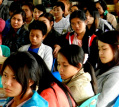The Salween Institute blends objective analysis and hands-on community empowerment programs to frame policy debate and help shape public policy in Burma/Myanmar based on social justice, environmental responsibilities and ethnic right to self-determination.
Analyses & Reports

Empowerment

Advisory Services

Support Us
|
Burma Needs a Practical Long-term Strategy on Rohingya Issue
By Greh Moo
(Opinion) – Since Burma’s military junta officially ceded power to a quasi-civilian government in 2011, the country has received much praise and applause from the international community for its many reforms initiated by the new government. A series of peace talks with various ethnic armed groups have been held and ceasefire accords with most, if not all, of the major ethnic armed groups have been signed to end decades of wars, human rights abuse and destruction in Burma’s periphery ethnic regions. Aung San Suu Kyi, along with most other political prisoners, has been freed and her party, the National League for Democracy, is allowed to participate in politics. The lifting of strict media censorship laws has also led to greater press freedom and freedom of opinions not seen in many decades. There is still occasional fighting in the Kachin state but a series of intense negotiations have also taken place to find a way to end the conflict. Constitutional issues remain a major obstacle to further reforms and reconciliation, but the government seems to be open to further compromise. As these developments have demonstrated over the past few years, negotiation and compromise is the key to the success of Burma’s reforms and transition to a fully democratic society. However, in spite of all the hope and positive signs of development in the last few years, there is still a major issue that seems to be off the table for negotiation: the future of Rohingya Muslims. Under the new reforms, the Rohingya people seem to have the most uncertain future in the country. While the rest of the country’s various ethnic groups may be able to negotiate for their future in the new Burma – successfully or not – the Rohingyas can only wait anxiously for their fate. Instead of feeling any sense of optimism about their future, the Rohingyas and Burmese Muslims have seen and suffered the brunt of sectarian violence orchestrated by nationalist and extremist elements of Burmese society with the tacit approval of the authorities. It’s a paradox that the new and democratic Burma should bring about misery, fear, worry and despair to anyone because ideally democracy should convey and bring the message of hope, freedom, peace, prosperity, and equality to everyone. But sadly for Burma’s Rohingyas, no efforts have been made by the government to reach out to them despite their plight constitutes one of the most burning issues facing the country. Instead, the government – along with the nationalist and extremist elements of Burmese society – has come out strongly against any policy that would accommodate the Rohingyas. Unfortunately, under the current political environment, any association or even a moral support for the Rohingyas is seen as political suicide. With this in mind, Aung San Su Kyi also tries to steer clear of any missteps that would give her opponents the impression that she supports the Rohingyas. But something that demands serious consideration is how long can the Burmese government turn a blind eye to the Rohingya issue? Can the crisis be resolved by simply ignoring the Rohingyas and hoping that they will somehow someday disappear through a policy of systematic subjugation and deprivation of their rights and existence? Aside from making public and official statements that Rohingyas are illegal Bengali immigrants and therefore have no rights to citizenship, Thein Sein’s government and opposition parties have been unwilling or unable to offer any alternative policy that would resolve the crisis and achieve a long term goal. The government and the vast majority of the anti-Rohingya elements may want to believe that the Rohingya issue can be solved by a policy of prolonged persecution and banishment. But we should understand that the numbers of Rohingyas are not a few hundreds or thousands, they are almost a million strong and most of them have lived in Burma for many generations. And whatever our opinion on the issue is – for or against – we have to be practical and accept the reality that the Rohingyas are with us and will not go anywhere. Continued marginalisation policies will not get us anywhere and will only continue to create political and humanitarian crises. Thus, instead of ignoring and dodging the Rohingya question, it’s only appropriate that the government, Aung San Suu Kyi, and all important stakeholders in Burma look for a practical and sensible policy that will resolve the problem once and for all and bring long-term peace and harmony between Rohingya Muslims and local Buddhist populations. Recognition of Rohingya crisis as a national issue To address the Rohingya crisis, there must be acknowledgement and recognition by all stakeholders that it is a national issue and that a sensible and practical policy needs to be adopted so that peaceful and long-term solutions can be achieved. As evident over many decades, and particularly in the last few years, turning a blind eye and ignoring the issue will not solve the crisis or achieve any lasting solution. The anti-Rohingya elements (politicians, nationalists, religious extremists or general public) may like to believe that Rohingyas do not exist, so nothing needs to be done about them. But the reality is different. Whether we like it or not, the Rohingyas – legal and illegal – have been in Burma for many generations; it’s morally wrong and politically impractical to forcibly push them out to sea, confine them to permanent displaced persons camps or push them back to where they may have come from. The only sensible and practical solution to deal with them is to adopt a policy that will promote greater integration and peaceful coexistence, and recognize those with legitimate backgrounds as citizens or legal residents. Some of the Rohingya may have been illegal immigrants, but the majority of them were born in Burma and can trace their family roots dating back many generations. With this in mind, it’s impractical and impossible to continuously deny their rights to citizenship and force them out of the country. To promote peaceful integration, state and national governments need to start working on verification processes to determine eligibility for citizenship or residency. Criterion for rights to citizenship should be based on proof of long-term residency and family roots. Besides, instead of resisting the international community’s involvement in the Rohingya issue to render support, the government should work with them in finding a lasting solution that can assure long-term peace and security for both Rohingyas and local Buddhist communities. It’s understandable that the government, politicians, and many Burmese nationalists view the question of the Rohingyas’ future as an issue of national sovereignty and therefore want to steer clear of any international interference. However, as the crisis remains unresolved and continues to worsen, it has also taken on an international dimension. As the Rohingya boatpeople continue to land in neighboring countries and news of their tragedy and horror at sea shocks the world, the Burmese government will continue to bear condemnation and criticism from human rights organizations and the international community. A high-ranking official of the European Union who has visited the internally displaced persons camps for the Rohingya refugees recently described their condition as one of the most horrible things she has seen in her life. On a related note, since the outbreak of anti-Rohingya and anti-Muslim movements began in 2012, attacks on innocent Burmese workers in Malaysia and terror plots against the Burmese embassy in Indonesia have also taken place. This indicates that fierce anti-Rohingya and anti-Muslim policies at home can jeopardise the safety of Burmese nationals abroad and negatively affect good relations between Burmese people and citizens of the neighboring Muslim countries. Rule of law and strong enforcement measures needed To deter and prevent further communal violence, strong law enforcement measures need to be implemented. Ideally it’s not enough to merely have laws on paper without any enforcement. The occasional outbreaks of sectarian violence that have taken place since 2012 shows that the government is only half-heartedly serious about preventing and stopping the violence. A strong rule of law must include harsh punishment for whoever breaks the laws and incites violence in order to send a fierce and unequivocal message that terror, hatred and lawlessness will not be tolerated in the new Burma. Along with strong rule of law, the peace and trust-building process will need to be carried out to restore coexistence between the feuding communities. Fears and hatred may have played a role in the outbreak of the sectarian violence, but they cannot be resolved with segregation and further marginalization. To restore trust and dispel fear, community outreach programs and interfaith initiatives need to be launched so that both communities can find ways to come together and work to promote understanding and harmony. This will include supporting civil society and community-based organizations working to promote community development, provide education and economic opportunity, and promote peace in the areas hit by the communal violence. This may not be easy at first, but will achieve payoff in the long run. And instead of blaming the illegal crossings between Burma and Bangladesh border as the source of the Rohingya problems, the government should put more resources in protecting and tightening security along the border so that further illegal crossings can be prevented. Tightened border security measures should also be accompanied by tackling corruption among local authorities tasked with protecting the border. Some of the Rohingya population may have come from Bangladesh illegally, but this is more the government’s own doing as a result of lax border security and corruption among the border security forces. Unless emphasis is put on securing the border and stopping further illegal crossing between Burma and Bangladesh, the Rohingya crisis will continue indefinitely. Politicians must stop playing anti-Rohingya and anti-Muslim politics To any knowledgeable Burma watcher, the outbreak of the first open communal violence in post-military Burma between local Buddhists and Rohingya Muslims in Rakhine State in the summer of 2012 was no coincidence. During her political struggle over the last two decades, Aung San Suu Kyi has generally spoken out against all kinds of human right abuses committed by the military rulers against ethnic minority groups. Her consistent support for human rights and freedom for everyone has earned her widespread support and respect from Burma’s ethnic leaders and ethnic communities. Given that the first open communal violence between local Buddhists and Rohingya Muslims erupted not long after Suu Kyi was freed from house arrest and her party was poised to enter elections that summer, it is possible that hardliners and nationalists in the government circles could have been behind these events in order to preempt her political success. Much evidence has pointed to this possibility. For instance, in most cases local authorities and security personnel did very little to intervene in or quell the violence. In some cases local residents also reported that some of the Buddhist attackers or instigators of violence were outsiders from other villages or towns. The recent arrests of some local politicians for their suspected role in instigating violence may have confirmed this suspicion. And instead of condemning the anti-Rohingya and anti-Muslim activities in a strong and decisive manner, the government has deliberately given its tacit support to those organizers of racism and extremist movements. When foreign media portrayed a prominent anti-Muslim Buddhist monk negatively, the government – notably the president – came out to defend him and speak out fiercely against the criticism. Protests led by thousands of Buddhist monks and anti-Rohingya and anti-Muslim activists against a visit by a delegation of the Organisation for Islamic Cooperation is indicative of government support for this policy. In contrast to the harsh treatment of land activists protesting against land confiscations and peace activists organizing peace events, anti-Muslim protests were given an easy pass and mostly ignored by the government. While land and peace activists were slapped with fines and prison terms, anti-Rohingya Mulsim activists were rarely bothered. Not to be outdone by her opponents in a changing Burma’s political landscape, Aung San Suu Kyi – the champion of democracy and human rights in Burma – has compromised some of her democratic values and moral principles by being mostly mute about the Rohingya issue and anti-Muslim activities in the country. As a shrewd and ambitious politician, it’s natural and understandable why she is pursuing this approach. But by pursuing this politics first and principle later policy, Suu Kyi won’t be able to escape and solve the Rohingya crisis in the long run. Consequently, she has also betrayed her moral principles and many people the world over who have looked up to her and supported her cause during her decades-long struggle against the brutal military rulers. One of her famous quotes reads: “Use your liberty to help promote ours.” Now that she has her own liberty she should not be afraid of helping others to promote theirs as well. She should speak out against the persecution and cruel treatment of anyone if she truly believes in human rights and democratic principles. She can be pragmatic on the Rohingya issue by recognizing and understanding that only a policy of greater integration will save the Rohingyas, restore trust and peaceful coexistence, and attain lasting solutions to the crisis in western Burma. Meanwhile, politicians and all stakeholders in Burma should also stop playing the anti-Rohingya politics for their own gain. The next general elections in 2015 should not be partly based on who would be the strongest anti-Rohingya or anti-Muslim candidate. Instead, policies of every major political party should be based on who can offer the most pragmatic, acceptable, and best solution to the Rohingya question. This opinion piece originally appeared on the Democratic Voice of Burma. *Saw Greh Moo is an Analyst/Program Officer for Community Empowerment Initiatives at the Salween Institute (www.salweeninstitute.org). His areas of focus are in good governance and citizen rights and responsibilities. He can be reached by email at [email protected]. The opinions expressed in this article are the author’s and do not represent the policy of SI. |

